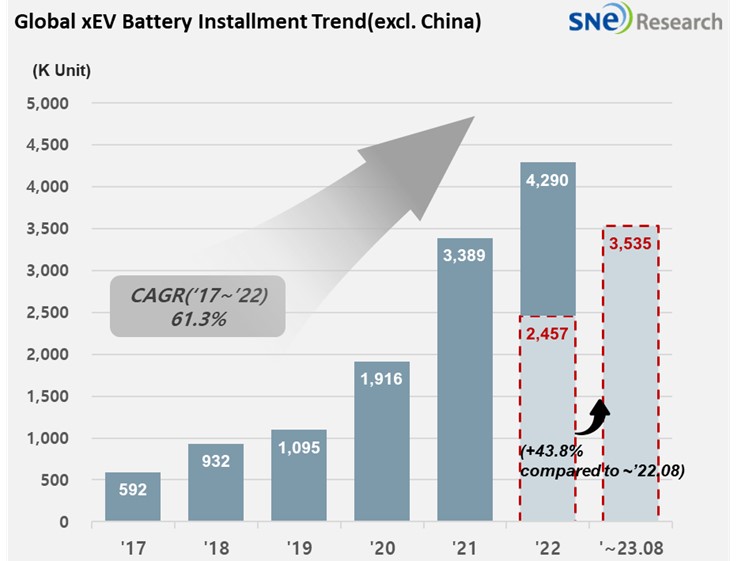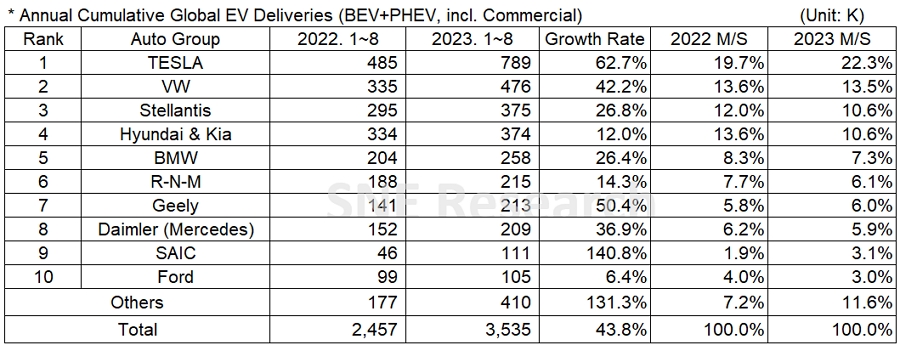From Jan to Aug in 2023, Non-China Global[1] Electric Vehicle Deliveries[2] Recorded 3.535 Mil Units, a 43.8% YoY Growth
- Tesla ranked top and Hyundai-KIA took 4th position in the non-China EV market
From
Jan to August in 2023, the total number of electric vehicles registered in
countries around the world except China was approximately 3.535 million units, a 43.8% YoY increase.

(Source: Global EV &
Battery Monthly Tracker – September 2023, SNE Research)
From Jan to July 2023, if we look at the number of electric vehicles sold by OEM groups in the non-China market, Tesla kept No. 1 position with a 62.7% YoY growth. Its growth was driven by the price-reduction strategy carried out from earlier this year and the tax credit offered to Model 3/Y by the US government as part of the US IRA. The Volkswagen group took the 2nd position in the ranking, recording a 42.2% YoY growth. The growth of VW Group was driven by steady sales of Audi E-Tron line-up including ID.4, a first, non-American EV model qualified for the EV tax credit offered by the US government. The 3rd place was occupied by the Stellantis Group supported by solid sales of both BEV and PHEV such as Fiat 500e and Jeep Wrangler 4xe. BMW, of which X5 xDrive50e model successfully met the qualification for the IRA EV tax credit, became the 2nd overseas brand who satisfied the qualification and ranked 5th on the list.

(Source: Global EV & Battery Monthly Tracker – September 2023, SNE Research)
Hyundai-KIA Motor Group posted
a 12.0% YoY growth led by IONIQ 5, EV 6, and Niro. The Group, recording a high profit
again in the 3rd quarter of this year, is expected to continuously
be in an upward trend and probably break another profit record again by
expanding its global sales of IONIQ 6 and launching KONA (SX2) Electric, EV9,
and Ray EV. The SAIC
Group, a strong player in the Chinese domestic market, safely entered the top
10 on the list with a triple-digit growth, based on favorable sales of MG-4,
MG-5, ZS, and HS models in Europe and Asia (excl. China).

(Source: Global EV & Battery Monthly Tracker – September 2023, SNE Research)
Despite uncertainties in the
market caused by specific policies in different countries, stiff regulations on
carbon emission in Europe, and the presidential election as well as strike
issues in the US, major OEMs in the US, China, and Europe have been continuously
working on overseas investment from mid/long-term, positive perspective on the
EV market. Their strategies can be interpreted as, for domestic markets, they
secure competitiveness as local makers under the auspice of protectionism
measures, while for overseas markets they tend to quickly respond to changes in
policies to overcome trade barriers.
[2] Based on electric vehicles (BEV+PHEV) delivered to customers or registered during the relevant period.

